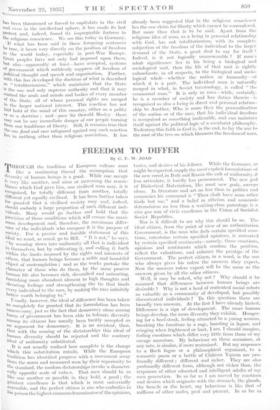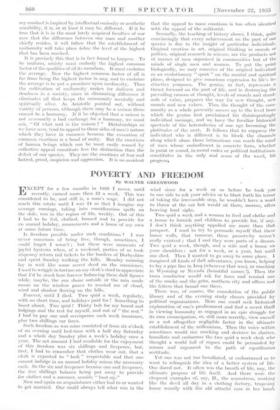FREEDOM TO DIFFER
By C. E. M. JOAD
THROUGH the tradition of European culture runs like a continuing thread the assumption that diversity of human beings is a good. While one savage i,s very like another, and aims at increasing the resem- blance which God gave him, one civilised man may, it is rcognised, be totally' different from another, totally different yet equally civilised. It has been further taken for granted that a civilised society may and, indeed, should embody a large proportion of such different indi- viduals. Many would go further and hold that the Provision of those conditions which will ensure the maxi- Ilium development and, therefore, the maximum differ- ence of the individuals who compose it is the purpose of .15,elety. For a precise and forcible statement of this meal we must, as usual, go to Mill. " It is not," lie says, ‘by wearing down into uniformity all that is indiVidual In themselves, but by cultivating it, and calling it forth within the limits imposed by the rights and interests of others, that human beings become a noble and beautiful Object of contemplation ; and as the works partake the character of those who do them, by the same process hnina.n life also becomes rich, diversified and animating, furnishing more abundant aliment to high thoughts and elevating feelings and strengthening the tie that binds every individual to the race, by making the race infinitely better worth belonging to." Usually, however, the ideal of difference has been taken so completely for granted that its formulation has been lineeessary, just as the fact that democracy alone among forms of government has been able to tolerate diversity ninong its citizens has usually been tacitly accepted as 411 argument for democracy. It is no accident, then, ,that with the 'coming of • the dictatorships this ideal of human diversity • should be rejected and the contrary ideal of uniformity substituted. It is not usually realised how complete is the change ‘yllieh this. substitution 'entails: While the European tradition has identified progress with a movement away from the norm and measured men by their superiority to the standard, the modern dictatorships invoke a diametri- cally opposite- scale of valms. That men should be as like One another as possible is, they hold, a good ; the greatest excellence is that which is most universally accessible, and the perfect citizen is one who embodies in his person the highest common denominator of the opinions, tastes, and desires of his fellows. While the Germans, as might be expected, supply the most explicit formulations of the new creed, in Italy and Russia the cult of uniformity, if less articulate, is hardly less pronounced. The new god of Dialectical Materialism, like most new gods, sweeps clean. In literature and art no less than in politics and economics his command is " Thou shalt have none other Gods but me," and a belief in atheism and economic determinism no less than a working-class parentage is sine qua non of civic excellence in the Union of Socialist Soviet Republics. • Nor is it difficult to see why this should be so. The ideal citizen, from the point of view of an authoritarian Government, is the man who feels certain specified emo- tions, entertains certain specified opinions, is animated by certain specified sentiments—namely, those emotions, opinions and sentiments which confirm the position, reflect the valuations, and enhance the prestige of the Government. The perfect citizen, in a word, is the one . who always gives his rulers the answers they expect. Now the answers rulers expect will be the same as the answers given by all the other citizens. Well, it may be asked, why not ? Why should it be . assumed that differences between human beings are desirable ? Why is not a herd of contented social robots as valuable as a community of developed, but possibly discontented individuals ? To this question there are broadly two answers. At the first I have already hinted. Difference is, a sign of development. The more human beings develop, the more diversity they exhibit. Hunger- ing for a beef-steak, feeling attracted to a young woman, breaking the furniture in a rage, boasting in liquor, and cringing when frightened or hurt, I am, I should imagine, feeling emotions which differ very little from those of my savage ancestors.' My behaviour on these occasions, at any rate, is similar, if more restrained. But my responses to a Bach fugue or a philosophical argument, to a romantic poem or a bottle of Chateau Yquem arc pro- foundly different ; different and richer. They are also profoundly different from, although not richer than, the responses of other educated and intelligent adults of my own generation.. In so far as I am moved by emotions , and desires which originate with the stomach, the glands, the bowels or the heart, my behaviour is like that of millions of other males; past and present.. In so far as my conduct is inspired by intellectual curiosity or aesthetic sensibility, it is, or at least it may be, different. If it be true that it is in the most lately acquired faculties of our race that the difference between one man and another chiefly resides, it will follow that the establishment of uniformity will take place below the level of the highest that has been reached.
. It is precisely this that is in fact found to happen. To be uniforrh,. society must embody the highest common factor of the qualities of all its members. It must enshrine the average. Now the highest common factor of all is far from being the highest factor in any, and to enshrine the average is to put a premium upon mediocrity. Thus the cultivation of uniformity makes for dullness and deadness in a society, since in eliminating difference it eliminates all that keeps the community mentally and spiritually alive. As Aristotle pointed out, without variety of persons, although there may be a unison there cannot be a harmony. If it be objected that a unison is not necessarily a bad exchange for a harmony, we must ask, " Of what sort is the unison ? " Dictatorships as we have seen, tend to appeal to those sides of men's nature which they have in common because the evocation of common emotions is a bond of unity. But the emotions of human beings which can be most easily roused by collective appeal constitute less the distinction than the defect of our species. They are the emotions of fear and hatred, greed, suspicion and aggression. It is no accident that the appeal to mass emotions is too often identical with the appeal of the militarist. Secondly, the. teaching of history shows, I think, quite convincingly that every achievement on the part of our species is due to the insight of particular individuals. Original creation in art, original thinking in morals or politics, original research in science, are the products not of masses of men organised in communities but .of the minds of single men and women. To put the point biologically, we may conceive of the original individual as an evolutionary " sport " on the mental and spiritual plane, designed to give conscious expression to life's in-' stinetive purposes. The genius, in fact, represents s thrust forward on the part of life, and in destroying the prevailing canons of thought, levels of morals and stand- ards of value, prepares the way for new thought, new morals and new values. This the thought of the com- munity as a whole presently moves up to the level from which the genius first proclaimed his disintegratinglY individual message, and we have the familiar historical spectacle of the heterodoxies of one age becoming the platitudes of the next. It follows that to suppress the individual who is different is to block the channels along which alone those intimations can reach the mind of man whose embodiment in concrete form, whether in paint or sound, in moral codes or political institutions, constitutes in the only real sense of the word, Ills progress































































































 Previous page
Previous page